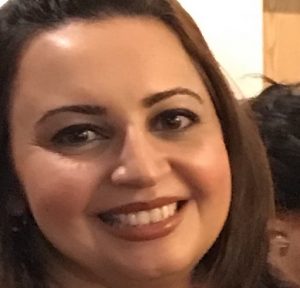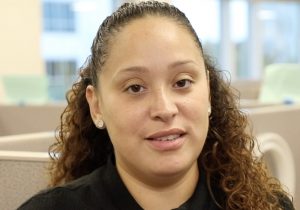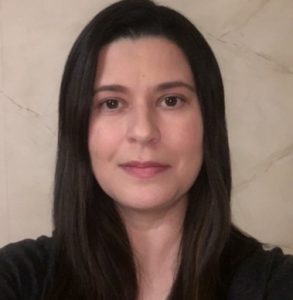Spotlight On…VNSNY Home Care Social Workers!
 Sandra Fleming — VNSNY Home Care Social Worker, Brooklyn Region
Sandra Fleming — VNSNY Home Care Social Worker, Brooklyn Region
My work involves all kinds of scenarios. Often, we’re securing long-term care for people who can no longer manage the activities of daily living and need somebody to come in and assist with food, shopping, light housekeeping and so on. But we also have hoarders, perhaps a new diagnosis of dementia or Lou Gehrig’s disease, and people who are not medication-compliant. And since this is New York City, there are lots of housing issues. There’s no such thing as a routine day!
I want to highlight how valuable it is that we work as a team. I had a young patient who’d had a debilitating stroke after giving birth. She lost most of her speech and couldn’t travel to the Social Security office. To obtain benefits over the phone, she was required to recite her Social Security number. So the speech therapist on our team worked with her for weeks. When she made the call, we were all there, holding our breath as she pronounced the numbers… and she did it! Little moments like that are part of what makes my job wonderful. I just saw a lady who had been the sole caregiver of her disabled mother. Her mother passed away and now she can’t pay the rent. I’m taking steps to get her a lawyer and arrange for public assistance, and working to place her in an assisted-living apartment building where tenants share a home health aide. That’s the kind of thing we do.
 Elza Moskowitz — VNSNY Home Care Social Worker, Queens Region
Elza Moskowitz — VNSNY Home Care Social Worker, Queens Region
My role is to help my patients get back into their communities and ease back into their lives, after they’ve received a diagnosis from their doctor or have just come home from the hospital. What I cherish about my job is the opportunity to meet such a cross-section of patients from all walks of life. People are amazing; I love their experiences and their tremendous strengths, even when they’re dealing with an illness. My role is to teach them and help them cope, but they also inspire and teach me so much in turn. I’m constantly researching new ways to help them, to make the most of what’s available to them.
Some people have said that they almost see me as a miracle worker, and I truly wish I could be that for everybody. My mission is to earn that title every day, even though it’s not always possible for every patient. The interactions are what I love about this job, what I give to my patients and what I get from them. It’s tangible and we both benefit. I walk away from my patients knowing that I made a difference in their world.
 Margarita Roldan — VNSNY Home Care Social Worker, Bronx Region
Margarita Roldan — VNSNY Home Care Social Worker, Bronx Region
As social workers, we take on many roles: We are advocates, teachers, service coordinators, and counselors. We also become an extension of the family in many cases. Our job is really about assessing a client’s needs and then assisting them in addressing those needs. As a social worker who works with both the pediatric palliative care population and with adult home care patients, there is never a dull day. On any given day, I may go from visiting a 14-year-old diagnosed with brain cancer, whose parents had to stop working in order to care for the child and are now in need of financial assistance to meet their basic needs, to an 80-year-old diagnosed with hypertensive chronic kidney disease and heart failure, who resides alone and needs help with preparing meals and getting laundry done.
The most rewarding part of my job is when I am able to provide concrete assistance that brings clients a sense of relief, such as helping a patient apply for Medicaid so they can get long-term care, or helping a diabetic patient obtain a glucose monitor to keep track of their sugar levels, or helping someone who had to stop working due to their medical condition obtain resources to pay their rent or buy food until their benefits are established.
 Emily Vargas — VNSNY Home Care Social Worker, Manhattan Region
Emily Vargas — VNSNY Home Care Social Worker, Manhattan Region
I go into the field and into people’s homes every day—like our visiting nurses, physical therapists, occupational therapists, and others—to assess our patients for any kind of community resources and long-term planning they might need. That can range from setting up Meals on Wheels to getting adult protective services involved. I feel like I could write a book of short stories because of the diversity of what I see in any given day: I could be in a multimillion-dollar home one moment and then go straight into a low-income apartment, and basically get exposed to two completely different ways of life and challenges.
One thing everybody has in common is that people value their independence. I think we can all relate to that. A lot of people are determined that they can do it on their own. They want to be in control of their lives and don’t like the idea of having a stranger in their home, taking care of them. I try to alleviate their concerns so that a safe discharge plan can be put in place. My job is rewarding when I feel that, despite these obstacles, I’ve been able to make a difference in my patients’ lives—when I know that their life is going to be easier because I was involved.
To view more profiles celebrating VNSNY Social Workers, click here.